Skip to content
Home
Spring Statement 2025 live: UK growth forecast halved for 2025, Reeves says, but longer term estimates upgraded
- Let’s take a closer look at that growth forecast from the Office for Budget Responsibility (an independent group of economists and analysts which, basically, marks the government’s homework).
- In short, it revised its forecast down for this year, but revised it up for the next four years.
- Here’s how the OBR’s October forecast compares to its forecast released today:
- 2025: down from 2% to 1%
- 2026: up from 1.8% to 1.9%
- 2027: up from 1.5% to 1.8%
- 2028: up from 1.5% to 1.7%
- 2029: up from 1.6% to 1.8%
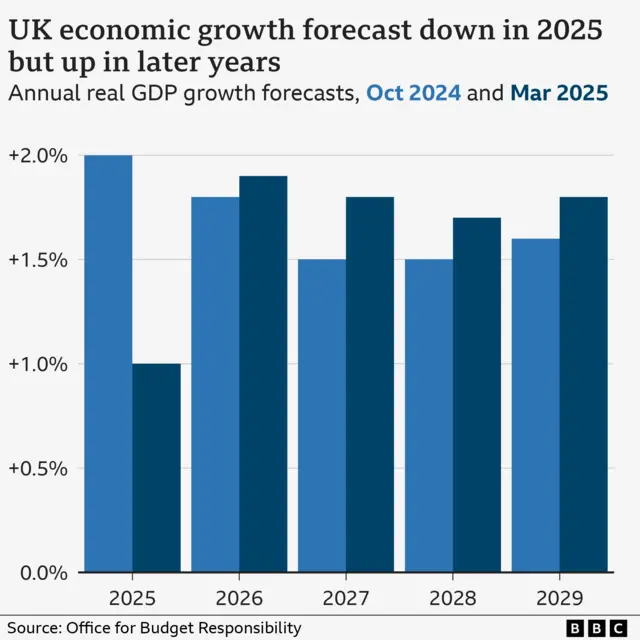
- Dearbail Jordan
- Business reporter
- The UK’s tax share – which means how much HMRC brings in compared to the size of the overall economy – is forecast to hit its highest level since the end of World War Two, the Office for Budget Responsibility (OBR) predicts.
- In its report, the forecaster reckons it will reach 37.7% of the economy by 2027/28.
- This is partly because of the increase in employers’ National Insurance contributions the government announced in October’s Budget.
- That figure, however, is highly speculative.
- In totting up its calculations for the future, the OBR assumes that the government will implement a 5p rise on fuel duty – something previous governments have been loathe to do.
 Kevin Peachey
Kevin Peachey- Cost of living correspondent
- The additional changes to the welfare reforms that were announced last week do mean less in benefits than some may have anticipated.
- For example, the government had said there would be a rise in the standard allowance for universal credit for 6.5 million people. That rise will now be £1 a week lower than previously billed.
- The health element of universal credit (which reflects a limited capability to work) was going to be halved for new claimants to £50 a week in 2026-27, then frozen.
- Now ministers have said that, in addition, existing claimants will see their entitlement frozen at £97 a week until 2029-30.

 Dharshini David
Dharshini David- Deputy economics editor
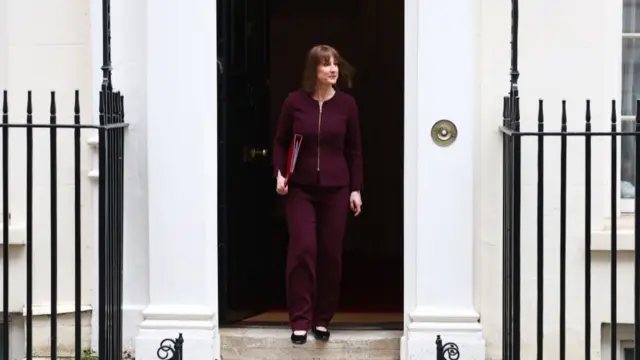 Image source, Getty Images
Image source, Getty Images- Rachel Reeves has had the awkward task of fronting a halving of growth forecasts calculate by the OBR for this year.
- But the chancellor scored a victory by persuading them to assimilate an expectation of the results of her planning reform policies in their longer-term forecasts for growth.
- That took some negotiation but added £15bn to the expectations of the economy’s income over 10 years – an assumption that eases some of the challenges for the public finances.
- But, as ever, remember that forecasts are uncertain.
- Growth forecast halved: The Office for Budget Responsibility (OBR) revised down the UK’s growth forecast for 2025 from 2% in the autumn to 1% today – a number Reeves says she’s “not satisfied with”. Longer term, however, the OBR says there will be GDP growth year on year until 2029/30
- Surplus forecast: Reeves said Labour is abiding by its self-imposed fiscal rules and moving from a deficit of £36.1bn in 2025/26 to a surplus of £9.9bn by 2029/30 – adding that the Treasury will hit its target of bringing in more than it spends “two years ahead of schedule”
- Headroom restored: The OBR says Reeves has restored the government’s headroom- which gives the chancellor leeway to cut taxes or increase spending in the future – by setting out cuts and reforms in today’s statement
- Tories attack Reeves’s record: Today’s numbers confirm that the UK is “poorer and weaker”, shadow chancellor Mel Stride told the Commons
- Welfare changes: Reeves said “it can’t be right” to write off an entire generation who are out of work and improperly using Personal Independence Payments (Pips)
- Defence spending’: The government will spend 2.5% of GDP on defence by 2027, which will be achieved by reducing overseas aid spending to 0.3% of gross national income. Reeves confirmed a £2.2bn funding boost for the Ministry of Defence from next year
- Inflation to tick up before falling back: The OBR predicted inflation would rise to an average of 3.2% next year, before the rate starts to fall. It is expected to reach the Bank of England’s 2% target from 2027 onwards
- While many countries are still waiting for US President Donald Trump to make up his mind about tariffs, the OBR has had a go at predicting what it would mean for the UK economy – and it’s not pretty.
- It says that if “global trade disputes escalate to include 20 percentage point rises in tariffs between the USA and the rest of the world”, it could reduce economic growth by as much as 1%.
- The OBR says that would more or less wipe out the surplus the government is predicted to have by 2029-30, reducing it “to almost zero”.
- Debt as a percentage of gross domestic product (GDP) is set to fall in five years’ time, a report by the OBR says.
- It means the chancellor will meet a key rule aimed at providing financial stability.
- What are these self-imposed rules? One is that the government’s day-to-day costs are paid for with tax revenues, which means it cannot borrow to pay for running departments.
- The other is that debt measured as a percentage of the economy is falling in the five years ahead.
- As we mentioned a little earlier, the Office for Budget Responsibility (OBR) published its fiscal outlook just as the chancellor finished delivering her Spring Statement.
- Included is its altered prediction for the pace of prices rises in the UK from the autumn Budget.
- Basically, it now thinks inflation will be higher in 2025 due to a peak in wholesale gas prices and higher oil prices.
- But then inflation will be lower “as energy prices drop, food price inflation falls, and wage growth eases back,” the OBR says.
- The forecaster now thinks inflation in 2025 will average 3.2% before “falling rapidly” to 2.1% in 2026, and reaching the Bank of England’s 2% target from 2027 onwards.
- The OBR had previously said inflation would be 2.6% in 2025, 2.3% in 2026, and 2.1% in 2027, finally falling to 2% in 2029.
- Back now to shadow chancellor Mel Stride in the Commons, who asks how voters can “believe” the chancellor, ending his response to the Spring Statement by strongly criticising Reeves.
- He accused the chancellor of reneging on promises not to increase borrowing or put up National Insurance, as well as to not hold more than one fiscal event a year.
- The shadow chancellor says we are all “poorer” and “weaker” because of Reeves’s policies, adding that she has made all the “wrong choices”.
- With that, Stride concludes his statement and sits down.
- We’ll bring you a recap of all the key moments from the Spring Statement shortly, before we turn to our crack team of correspondents for their quickfire analysis on what we’ve heard.
- As Mel Stride continues to deliver his response, the government’s official forecaster – the Office for Budget Responsibility (OBR) – has published its fiscal predictions, some of which we’ve already heard from Rachel Reeves.
- The OBR says the chancellor has restored the Treasury’s “headroom” – which, in short, means how much leeway the government has to cut taxes or increase spending while still sticking to its self-imposed rules.
- It says the £9.9bn surplus it generated in the autumn Budget would have been more than wiped out by interest payments on government debt, leading to a £4.1bn deficit by 2029/30.
- But policy changes, including welfare reforms and cuts to day-to-day departmental spending, will “restore it to the £10bn surplus the chancellor had in October”, the OBR says
- However, borrowing and debt are expected to be higher than previously forecast.
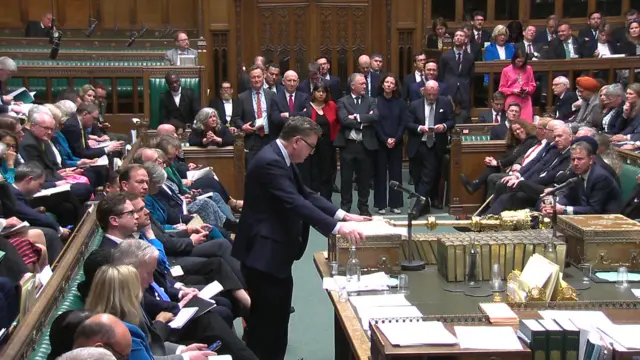 Image source, UK Parliament
Image source, UK Parliament- Stride says Reeves has “tanked the economy” and claims the government fabricated the £22bn blackhole ministers say they found in the public finances when they took office.
- Reeves is not ramping up taxes today, but Stride says this is “cold comfort” to people across the country.
- He says people will still be “buckling” under taxes, which will be rising “to the highest tax burden… in the history of our country” due to previous policy announcements.
- Stride asks Reeves to assure the country that she will not ramp up taxes further in the autumn.
- Stride now turns to this morning’s new inflation figures, which showed the rate at which everyday prices are rising fell to 2.8%.
- He says the current level is twice what it was forecast to be under the Conservatives, and blames Reeves. Households and businesses will pay the price, he adds.
- Stride says the OBR also says unemployment is forecast to rise despite the government’s plans to get people back to work.
- For context: While the inflation rate of 2.8% is still above the Bank of England’s 2% target, this morning’s announcement was cautiously welcomed by ministers as some analysts expected it to increase.
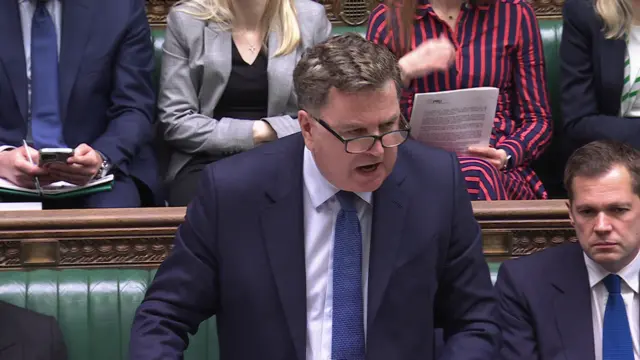 Image source, UK Parliament
Image source, UK Parliament- Shadow chancellor Mel Stride responds to the Spring Statement for the Conservatives.
- He says that Reeves promised to bring “stability” to public finances, but this speech amounts to an “emergency budget”.
- Stride says the UK was once growing at the fastest rate in the G7 but growth forecasts have been halved – “cut in two as a consequence of decisions and choices” by Reeves, he adds.
- The world is changing, Reeves says again.
- “We can see that and we can feel it. A changing world demands a government that is on the side of working people,” she goes on.
- She says the government’s plan to get Britain building will drive growth in the economy and put more money in people’s pockets.
- And that’s a wrap on her Spring Statement – over now to shadow chancellor Mel Stride for his response. Stay with us.
- Reeves now says that the OBR has confirmed that real household disposable income will grow “at almost twice the rate” that had been anticipated in the autumn.
- The independent analysts say households will be on average £500 better off under this government, Reeves tells the Commons
- Reeves says “this is just the start” and that the OBR has upgraded its growth forecast next year and “every single year thereafter”.
- The Commons is filled with noise at this announcement.
- The figures she outlines are as follows: GDP growth of 1.9% in 2026, 1.8% in 2027, 1.7% in 2028, and 1.8% in 2029.
- By the end of the decade, the economy is expected to be larger than had been predicted by the OBR’s when it produced forecasts ahead of the Budget last October.
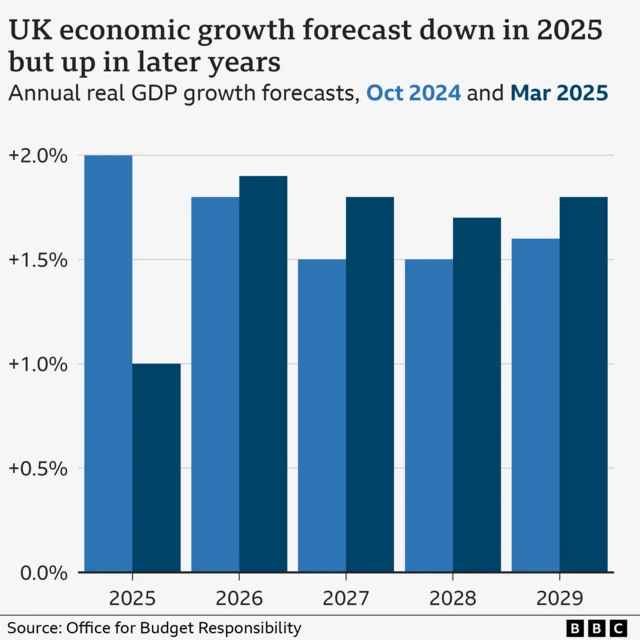
- On education, Reeves says that earlier this week the education secretary announced more than £600m to train up to 60,000 more construction workers.
- This includes 10 new technical excellence colleges across every region of the country, she adds.
- Reeves says the planning system that Labour inherited was “far too slow”.
- She says that the OBR has assessed that Labour’s planning reforms “will lead to housebuilding reaching a forty year high”.
- Changes to the national planning policy alone, she adds, will help build over 1.3 million homes in the UK within the next five years.
- This will take Labour within “touching distance” of its promise to build 1.5 million homes in England this parliament, she says.
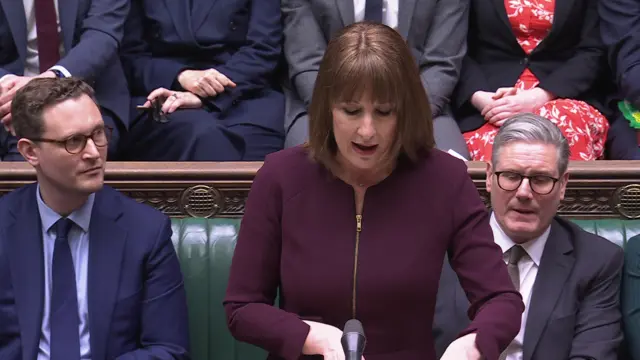 Image source, UK Parliament
Image source, UK Parliament- Growth will take hard yards, Reeves says.
- In her first week as chancellor, she announced the government was pursuing the most ambitious set of planning reforms in decades.
- Reeves says the OBR has today concluded these reforms will permanently increase the level of real GDP by 0.2% by 2029-30 – which amounts to an additional £6.8bn in the UK economy – and by 0.4% over the next 10 years.
- Reeves says this is the “biggest positive growth impact that the OBR have ever reflected in their forecast, for a policy with no fiscal cost”.
- Following her announcement on defence spending, the chancellor outlines the actions the government will take with this additional investment.
- She says she wants the “whole country” to feel the benefits.
- A minimum of 10% of the Ministry of Defence’s equipment budget will be spent on new technologies including drones and AI-enabled technology, Reeves says
- Areas like Glasgow, Derby and Newport will see advanced manufacturing production with new business opportunities and creating more demand for skilled jobs.
- She confirms plans for investment in Barrow – a town in north-west England where the UK’s nuclear submarines are maintained – in order to create thousands of jobs in the area.
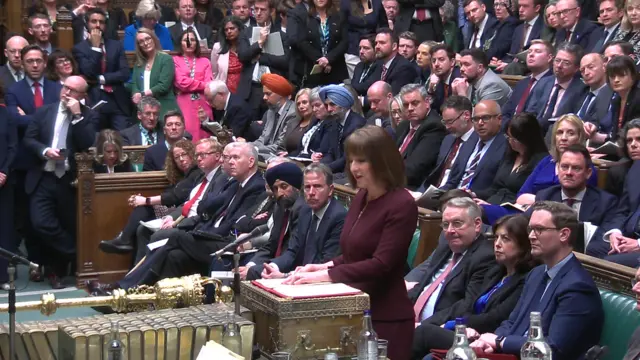 Image source, UK Parliament
Image source, UK Parliament
Page 2
- A changing world presents challenges and new opportunities, Reeves says.
- The chancellor announces she will provide an additional £2.2bn in spending for the Ministry of Defence next year, because they have to act quickly in a “changing world”.
- We already knew the government planned to ramp up defence spending, but now Reeves has set out what that will look like in the short-term.
- Turning to the impact of uncertainty on the economy, Reeves says the government must work closely with the Bank of England.
- She says this means working with the independent Monetary Policy Committee “in their work to meet the 2% inflation target”.
- Having peaked at 11% under the Tories, Reeves suggests that inflation will hit its 2% target by 2027.
- She says this will give the economy “the stable platform it needs to grow”.
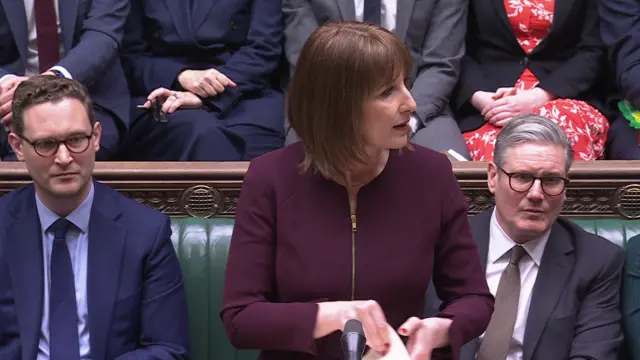 Image source, UK Parliament
Image source, UK Parliament- Reeves says she is increasing capital spending by an average of £2bn a year compared to the autumn.
- She says that is needed to drive growth in the economy and to meet vital defence commitments.

 Simon Jack
Simon Jack- Business editor
- As expected, the chancellor says the OBR has slashed its growth forecast for the coming year in half from 2% to 1% – still more optimistic than Bank of England at 0.7%.
- Interestingly, she didn’t list the growth numbers for rest of the period as chancellors usually do.
- We will have to wait for the OBR release in a few minutes but cutting next year in half should mechanically make later years easier to grow.
- The OBR has revised down the UK’s growth forecast for 2025 from 2% in the autumn to 1% today.
- “I am not satisfied with these numbers,” she says – but she adds the government is “serious about taking the action needed to grow our economy”.
- Reeves says she is bringing forward £3.25bn of investment to deliver reforms to public services via a new so-called transformation fund.
- It will bring down the costs of running the government by the end of the decade, she says.
- Reeves tells the Commons the first allocations from this fund will go to voluntary exit schemes to reduce the size of the civil service.
- It will also be used to invest in AI tools, technology improvements for the Ministry of Justice’s probation services and up-front investment to support children in foster care.
- Ultimately, this work will help deliver a further £3.5bn of day-to-day savings by 2029-30, Reeves says.

- Dearbail Jordan
- Business reporter
- Reeves has confirmed that welfare benefits will be cut by £4.8bn but it looks like the government has had to find other areas to reduce costs.
- The chancellor has said that the Universal Credit Health element will be cut by 50% and then frozen for new claimants – last week, we were not expecting that freeze.
- Reeves says in recent months the government has “begun to fundamentally reform the British state” to make it more efficient and productive.
- She outlines previous policy announcements, such as plans to abolish the arms-length body NHS England, which ministers say will allow them to improve the health service more quickly.
- She says the government is taking forward work to “significantly reduce the costs of running government” by 15%, or £2bn, by the end of the decade. These are the civil service cuts we’ve heard about in recent days.
- The state can be “leaner and more agile”, Reeves adds.
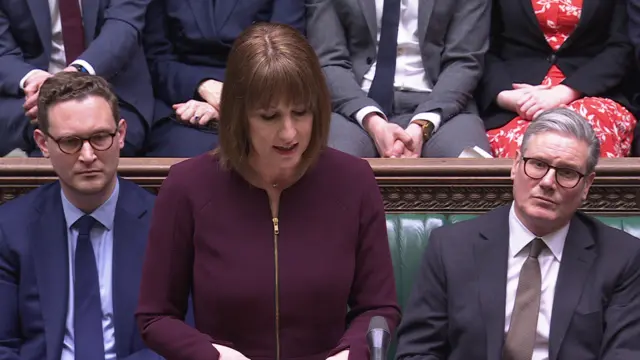 Image source, UK Parliament
Image source, UK Parliament- The chancellor confirms two steps we’ve known for several weeks the government was going to take.
- Defence spending will increase to 2.5% of GDP – a hike which will be acchieved by cutting overseas aid to 0.3% of gross national income.
- Reeves says the aid cut will save £2.6bn in day-to-day spending in 2029-30, allowing the government to invest in defence spending.
- Reeves says welfare spending as a share of GDP will fall between 2026-27 and the end of the decade.
- The total savings from the package will be £3.4bn, she says, citing a forecast from the OBR.
- As we’ve been reporting this morning, the Treasury originally indicated these changes would save £5bn, but the OBR said those calculations were overly optimistic.
- Media caption,
- Reeves: Labour is the party of work
- Labour is the party of work, Reeves says. She goes on to say that if you can work, you should – and if you can’t you should be supported.
- She then refers to the OBR statement today which estimates her package will save £4.8bn in the welfare budget.
- The chancellor adds that the Universal Credit standard allowance will increase from £92 per week in the financial year 2025/26 to £106 per week by 2029/30.
- However, the Universal Credit health element will be “cut by 50% and then frozen for new claimants”.
- As both sides of the the Commons either cheer or jeer, Reeves moves on to pledging a further crackdown on tax evasion.
- She says there will be no tax increases as a result, but adds that when working people are paying their taxes, it is not right others are avoiding doing so.
- The Treasury will set out plans today that will “increase the number of tax fraudsters charged each year by 20%”.
- Reeves says these changes will take the total revenue raised from reducing tax evasion to £7.5bn, figures the chancellor says have been verified by the OBR.
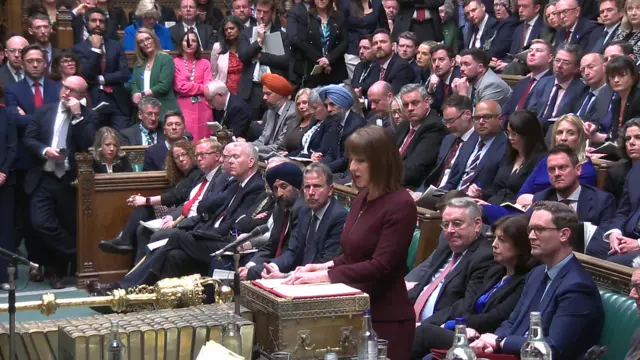 Image source, UK Parliament
Image source, UK Parliament- Reeves says the OBR has forecast that her investment rule is also met two years early.
- Net financial debt is forecast to be 82.9% of GDP in 2025-26 and 83.5% in 2026-27, before falling to 82.7% in 2029-30, she says.
- That provides headroom – in other words, spare cash the government can spend on other priorities at a later date – of £15.1bn by the end of the decade, she says.
 Faisal Islam
Faisal Islam- Economics editor
- The chancellor has announced that the key fiscal rule would have been missed by £4bn due to the rises in what it costs for the government to borrow money.
- Her measures reverse that and reinstate the room for manoeuvre – which, at the time of the Budget last autumn, was forecast to be £9.9bn.
- So the total correction – or repair job – in this statement is about £14bn by the end of the Parliament in 2029/30.
- Reeves continues to speak about her own fiscal rules and repeats that changes in the global economy have altered the picture since the Budget in October.
- She says that, according to the OBR’s forecast, the current budget would have been in deficit by £4.1bn in 2029-30. Last autumn, it was forecast to be in surplus by £9.9bn in the autumn.
- The chancellor says that due to her steps today she has “restored in full our headroom” – in other words, she has found a way to save the money which was being eaten up by the rising cost of borrowing money.
- She says this means moving from a deficit of £36.1bn in 2025-26 to a surplus £9.9bn by 2029-30. The forecasts indicate the budget will be in surplus two years ahead of schedule, Reeves adds.
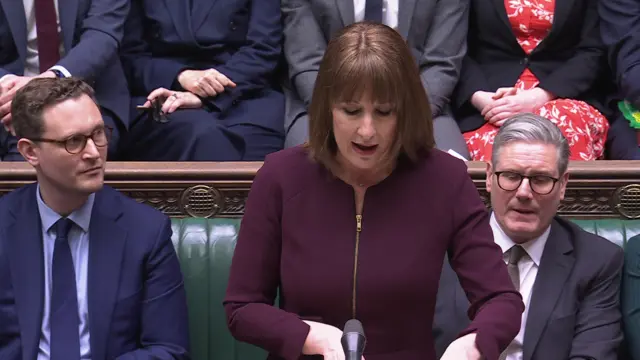 Image source, UK Parliament
Image source, UK Parliament
 Damian Grammaticas
Damian Grammaticas- Political correspondent
- As the chancellor stands to speak she’s flanked by all the holders of the “Great Offices of State”.
- There’s the prime minister, who was of course here for PMQs, the home secretary, and the foreign secretary. On top of that we have the deputy prime minister, the work and pensions secretary and others.
- Moral support definitely. But also practical support too from the Labour backbenches who cheered as Keir Starmer says he has full confidence in his chancellor.
- Some Labour MPs, however, are unhappy at the welfare cuts she’s pursuing, and the fact this statement today will go even further than what was announced last week.
- The government insists this is important not just to make sure the welfare system is sustainable in future and but also as it’s right to who can into work.
- And the chancellor is arguing, the world is presenting new challenges, which she has to rise to.
- Reeves tells the Commons again that she’s sticking to her fiscal rules – the guidelines she has pledged to stick to while deciding how to spend taxpayers’ money.
- The first is balancing the budget by 2029/30, so that day-to-day spending is met by tax receipts, she says. In other words, that the government can pay its regular bills without having to borrow money,
- The second is that net financial debt falls by the end of the forecast period to 2029/30.
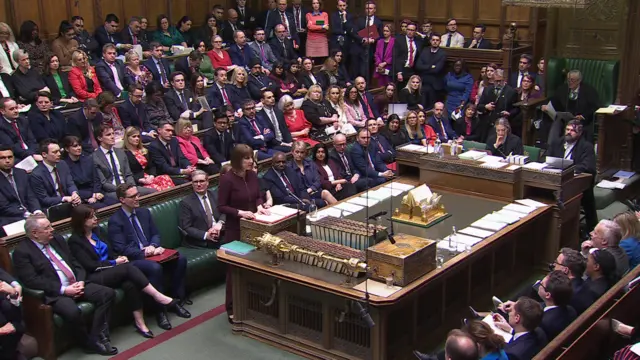 Image source, UK Parliament
Image source, UK Parliament- Reeves turns now to the fiscal rules she set out in October Budget – calling them “non-negotiable”.
- She says they will bring “stability” to the economy and “security” for working people.
- She refers next to Liz Truss’s mini-budget, saying the British people have seen what happens “when a government borrows beyond its means”.
- The chancellor says the government’s task is to “secure Britain’s future in a world that is changing before our eyes”.
- The threat transformed when Putin invaded Ukraine, a situation which has since escalated further, she says.
- Reeves says the global economy “has become more uncertain” and that borrowing costs are on the rise “for many major economies”.
- Reeves begins her statement by casting back to Labour’s general election victory.
- She says the party was elected to bring about change, security for working people and to deliver a decade of national renewal.
Page 3
 Emily Atkinson
Emily Atkinson- Live page editor
- Prime Minister’s Questions has just ended, which means it’s time for Chancellor Rachel Reeves to deliver her Spring Statement.
- Earlier, she told a meeting of cabinet that the announcement would “reflect a slowing outlook for global growth”, according to a Downing Street readout.
- We’re expecting Reeves to speak for 20-30 minutes. Mel Stride, her Tory counterpart, will then respond for the opposition.
- We’ll be covering it all with live updates and expert analysis on this page – follow along by tapping the watch live button above.
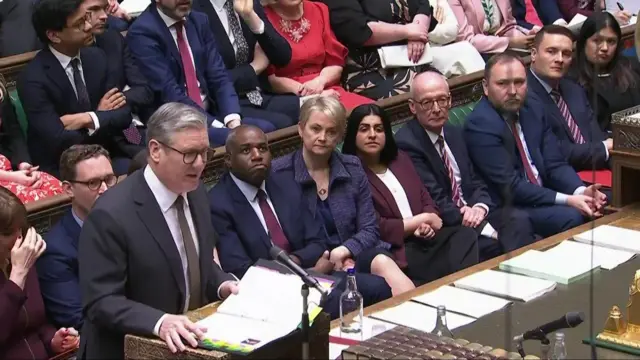 Image source, PA Media
Image source, PA Media- We’re now minutes – or perhaps even seconds – away from the Spring Statement. Before that gets going, here’s a quick digest of how PMQs unfolded:
- Education:
- Asked by Kemi Badenoch why Labour MPs voted against banning phones in schools, Starmer said it would be “unnecessary” – emphasising the need to instead ensure the content children access is age appropriate
- Badenoch praised the previous Tory government’s education record, saying more schools were likely to be considered “good” or “outstanding” – a measure that’s no longer used by Ofsted. In response, the PM said Labour was driving up standards
- National Insurance
- Pressed on whether teachers would be protected from hikes to employers’ NI – which Badenoch called a “jobs tax” – Starmer said the Tory leader wanted all the benefits of Labour’s policies, without explaining how she’d pay for them
- Disability
- The SNP’s Westminster leader, Stephen Flynn, asked Starmer what reassurances he could give to disabled people who might be affected by welfare reforms. In response, the PM said there was a need to help those who can work get into work
- Security
- Lib Dem leader Ed Davey cast his question across the Atlantic, referencing a recent US group chat leak discussing military action in Yemen. Starmer said London and Washington were in touch on a daily basis
- The front bench is now changing over – standby.
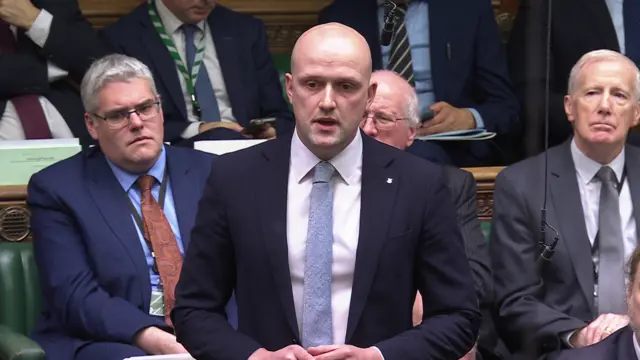 Image source, UK Parliament
Image source, UK Parliament- The SNP’s Stephen Flynn asks the PM about the planned reforms to welfare and speaks about his own long-term disability, telling the Commons: “I know how it feels.”
- He goes on to say that 55% of children living in poverty in Scotland have a member of their household who is disabled.
- Can the government explain how making their parents poorer is going to lift them out of poverty, he asks.
- Starmer says a member of his own family had a disability – the PM has often spoken about his late mother’s health struggles. He says the government must help those who can work get into a job, he adds.
- We will hear more about the government’s plans for welfare during the Spring Statement shortly.
 Damian Grammaticas
Damian Grammaticas- Political correspondent
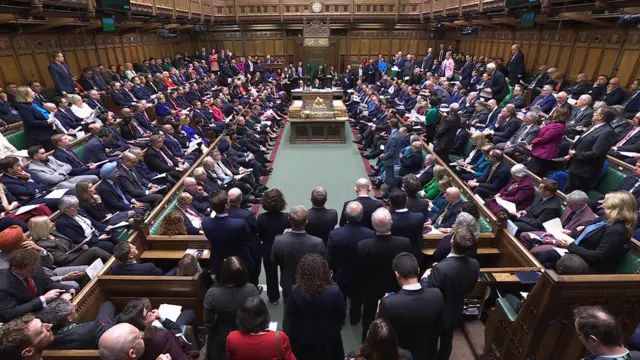 Image source, UK Parliament
Image source, UK Parliament- Inside the Commons chamber you can already tell the stakes are high for Chancellor Rachel Reeves simply by the volume level, which is definitely dialled up as PMQs gets under way.
- Starmer begins with a pre-emptive defence of the government, saying the Spring Statement will show they are going “further and faster”. Cue cheers and groans in equal measure from the opposing sides of the House.
- Badenoch begins her questions with a sideswipe at the chancellor and what’s coming after PMQs, calling it “an emergency budget”.
- The Tories are characterising it as that so they can paint the government as scrambling to have a second go at how they handle the public finances since they came to power.
- Cue more cheers and groans.
- This isn’t a Budget with tax-raising measures but the decisions on cuts in it will be important for many. The statement will also help define how the government is seen in the world outside Parliament and among MPs too.
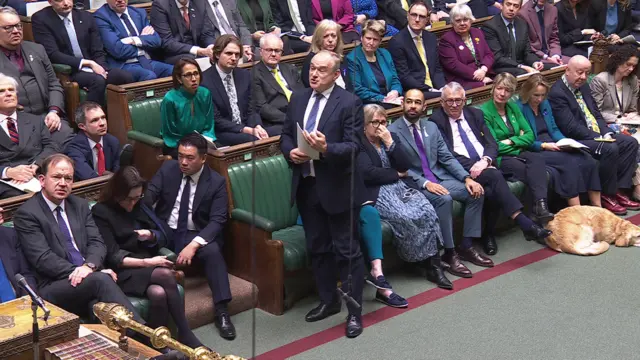 Image source, UK Parliament
Image source, UK Parliament- Liberal Democrat leader Ed Davey now puts his two questions to the prime minister.
- He first asks about the digital services tax and online safety legislation in light of the recent Netflix drama, Adolescence, which touches on the impact of social media on young people.
- Davey asks the PM to commit to ensuring British laws on tax and social media are “written in this House and not the White House”.
- “Of course – as he well knows,” Starmer replies, adding that new measures will be coming in the next few months.
- Davey’s second question is around a recent incident where a journalist was added to a US group chat in which senior figures discussed military action in Yemen.
- Starmer says the UK works with the US on a “daily basis” but unpicking relations with the US would not be “responsible”.

 Henry Zeffman
Henry Zeffman- Chief political correspondent
- While everybody is focused on the Spring Statement, a reminder at PMQs that the political and economic consequences of October’s Budget are still unfolding.
- Among a set of questions themed around education, Kemi Badenoch demanded that Keir Starmer do more to protect schools from the impact of the increase in the employer’s rate of national insurance – which she labelled a “jobs tax”.
- This was one of the most significant parts of the Budget, but it still has not taken effect – it will come into force at the start of the new tax year, which begins next week.
- Badenoch again says teachers’ jobs are not guaranteed to be safe. She says under the Tories, English schools shot up the international league tables, but in Wales standards fell.
- She asks if the prime minister can point to any evidence that “discredited” academy reforms will improve school standards.
- For context: The Children’s Wellbeing and Schools Bill is set to change the rules around how academies – a model of school introduced by the previous Tory government – pay their staff and the material they can teach.
- Starmer says the vast majority of schools are already academies, and says the opposition needs to instead think again about why some are failing.
- He then says the previous Conservative government left them with an NHS on its knees, open borders and crashed the economy.
- Badenoch asks Starmer if he can guarantee that no teacher will lose their job as a result of the “jobs tax”.
- Starmer says a record amount of money is going into schools and other public services, and claims Badenoch wants “all the benefits” of Labour policies but can’t say how she will pay for it.
- Badenoch says Starmer is not answering the question about discipline in schools – because he “doesn’t care”.
- She says his approach to schools is “purely ideological”. She asks whether schools will be compensated for an upcoming National Insurance increase that will cost schools, as they will have to pay more tax on teachers’ wages.
- “The education secretary promised to compensate schools in full for the jobs tax. Why hasn’t it happened?” she asks.
- Starmer responds that his teenage children both go to state schools, so he is invested in it, and that’s why he’s driving up standards.
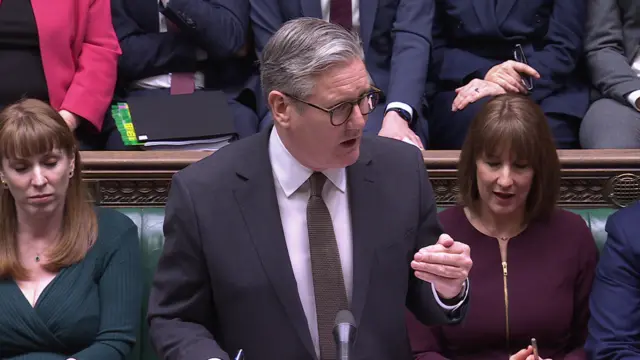 Image source, UK Parliament
Image source, UK Parliament- Badenoch now says mobile phones disrupt half of GCSE classes every day.
- Discipline is the number one issue in many schools, she says.
- Starmer says that, under the Tories, a third of children started school without appropriate development levels – such as not knowing how to use a knife and fork and not having good enough maths and English.
- Badenoch pushes again on Labour not introducing a ban on phones in schools – claiming only one in 10 is smartphone free.
- She cites teachers as saying schools with a ban have better results.
- Starmer says: “We need to ensure that all schools do this – but the vast majority do.”
- He again says the important thing is controlling the content children are able to access regardless of where they are.
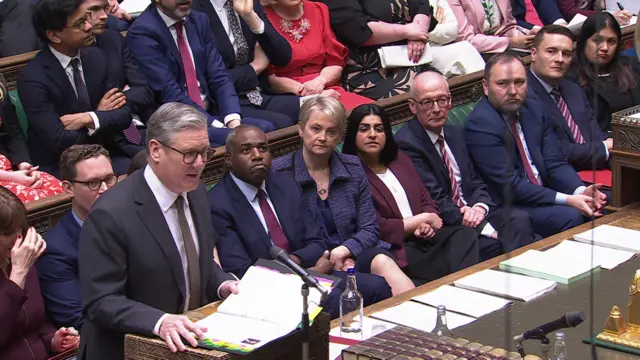 Image source, UK Parliament
Image source, UK Parliament- After a lot of jeering, Starmer replies, telling Badenoch that Labour MPs voted not to ban phones in schools last week because it’s “unnecessary”.
- Schools already do it, he says, and the important thing at stake is ensuring children don’t have access to harmful content online. He says he is willing to work across the Commons to achieve that.
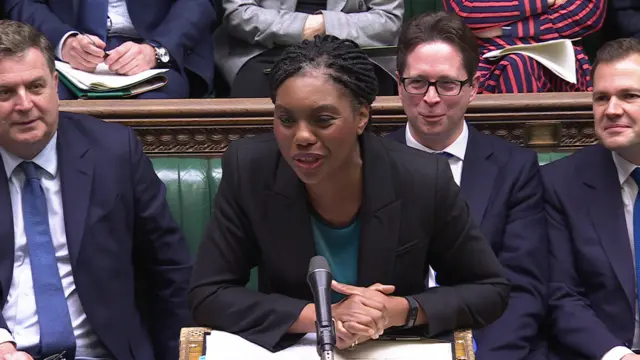 Image source, UK Parliament
Image source, UK Parliament- Badenoch begins by calling the Spring Statement an “emergency Budget”, saying Reeves is scrambling to fix the “mess” she has made.
- She says even the Home Secretary Yvette Cooper’s husband – TV presenter Ed Balls – calls it an emergency Budget.
- Badenoch then asks why Labour MPs voted against banning phones in schools last week.
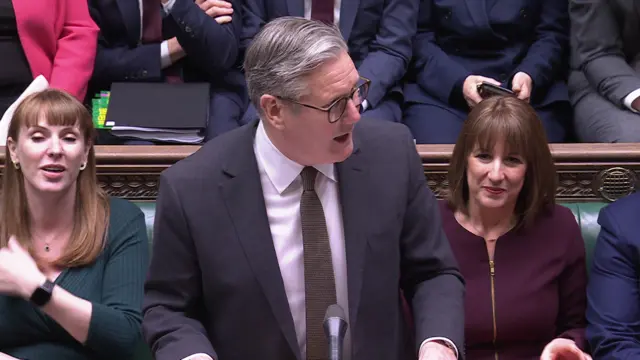 Image source, UK Parliament
Image source, UK Parliament- Keir Starmer takes his place at the dispatch box and PMQs gets under way.
- We’ll be bringing you updates throughout and you can follow along by pressing watch live at the top of this page.
- Reeves’s statement is expected to begin immediately afterwards – stick with us.
 Emily Atkinson
Emily Atkinson- Live page editor
- We’re nearing the first of the day’s big set piece events: Prime Minister’s Questions, which gets going at midday.
- It may well be a tamer affair than usual as MPs save their strength for the chancellor’s address at 12:30 GMT.
- As always, we’re in it for the long haul, bringing you live updates and analysis on all the action.
- With just 10 minutes to go, here are three key things you need to know:
- Where’s it happening? The House of Commons in Westminster
- How long will it go on for? The chancellor’s up first – she’ll speak for around half an hour. The Tories’ Mel Stride will then offer his response.
- Where can you watch it? On BBC iPlayer and/or on this page – just tap watch live above.

 Dharshini David
Dharshini David- Deputy economics editor
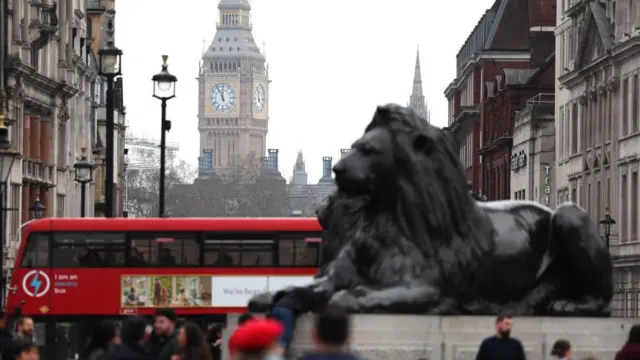 Image source, EPA
Image source, EPA- The chancellor may cut £10-£15bn from her future spending plans, to meet her own self-imposed rules.
- Big numbers, but a small proportion of the total – way over £1tn – the government spends every year.
- The axe will be focused on a few areas. Rachel Reeves will provide more detail on how the planned savings of £5bn to welfare spending, outlined last week, breaks down.
- Hundreds of thousands of people are set to lose thousands in PIP and universal credit payments.
- Civil service jobs could also be under threat due to plans to cut Whitehall administration budgets.
- And there could be a few billion pounds more siphoned off from the amount earmarked for future public services.
- Once the government’s priority areas such as defence and health are accounted for departments like justice, transport and higher education may fail to see future budgets keep up with inflation.
- But we’ll have to wait until June’s Spending Review for that detail.

 Henry Zeffman
Henry Zeffman- Chief political correspondent
- How is the sudden addition of some more welfare cuts beyond those announced last week going down among Labour MPs?
- Not well.
- It’s important not to overstate the scale of the internal opposition to what was announced last week. There was fairly wide unease among Labour MPs from all wings of the party.
- But concerted and vocal opposition was mostly confined to those who disagree with Keir Starmer and Rachel Reeves on a host of issues.
- This morning, though, there is real frustration – and in some cases, hot anger – from those Labour MPs who stayed publicly loyal and had difficult conversations with anxious constituents and annoyed activists.
- Many of them want to understand what changed in the past week which meant that the package could not have been announced in full by Liz Kendall last week.
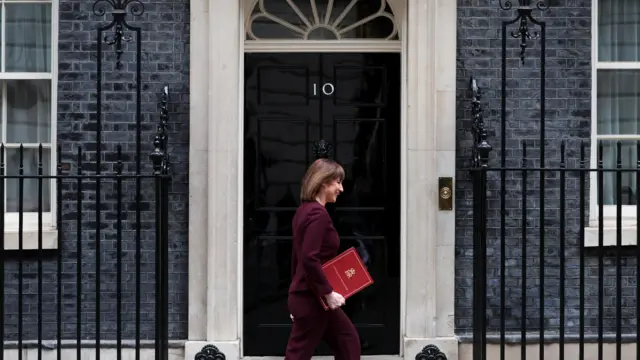 Image source, Reuters
Image source, Reuters- Chancellor Rachel Reeves has left Downing Street and is now heading to the Commons.
- At 12.30 she will deliver the speech we’ve been building up to all morning.
- There’s a lot to happen before then though – not least PMQs – so stay tuned.
 Kevin Peachey
Kevin Peachey- Cost of living correspondent
- Tighter eligibility criteria for disability payments will have a direct impact on many thousands of benefit claimants.
- However, those changes are centred on Personal Independence Payments (Pip) which are paid in England, Wales and Northern Ireland – but not Scotland.
- Universal Credit, on the other hand, is UK-wide.
- Today there should be more detail on where cuts will come and what sorts of benefits are affected.
- In the case of Scotland, there may not be a direct impact initially – but a reduction in Treasury funding allocated to the administration in Scotland for welfare benefits could be felt.
- Dearbail Jordan
- Business reporter
- The Office for Budget Responsibility (OBR) is an independent group of economists and analysts which, basically, marks the government’s homework.
- It looks at official plans for both tax and spending, and forecasts what effect they will have on the UK economy as well as on the public finances.
- The OBR is not part of the government but works closely with the Treasury. It releases two reports a year, coinciding with the Budget as well as events like the Spring Statement.
- The idea of the OBR is to show that the government is being responsible with the nation’s finances, that it can pay its debts.
- Financial markets – which determine some interest rates that the government pays on its borrowing – take a great deal of notice of what the OBR says.
- But the thing to remember about the OBR is that it makes predictions. Its forecasts are not facts, rather guidance on what could happen based on what the government tells it.
Page 4
 Emily Atkinson
Emily Atkinson- Live page editor
- OBR-Treasury clash: Last night, it emerged the OBR – the independent body which inspects the Treasury’s plans – was disputing the government’s estimates about how much welfare changes can save.
- More cuts: Ministers say they can save £5bn – but the OBR reckons it’s more like £3.4bn. Now we’re expecting Chancellor Rachel Reeves to announce additional cuts in her Spring Statement.
- Inflation: At 07:00 this morning, the latest official inflation statistics were published. At 2.8%, the rate of price rises was slightly lower than expected. Despite that modest good news, Defence Secretary John Healey said the country should expect the chancellor to deliver a “tough, strong statement in tough times”.
- Final discussions: A short time ago, the cabinet finished meeting for their final pre-statement discussions. Soon, it will be all eyes on the Commons to find out what plans they signed off.
- Hayley Clarke & Emma Pengelly
- Reporters
 Image source, Supplied
Image source, Supplied- Image caption,
- Elspeth with her assistance dog Podge
- Elspeth Edwards, 20, from Worcester, is very worried about the disability cuts.
- She currently receives Pip and LCWRA (Limited Capability for Work and Work-Related Activity) – the universal credit health top up, which the government has said it plans to cut for those aged 18-22.
- Elspeth says that she is unable to work due to her conditions, as she faints multiple times a day, is in “immense pain constantly” and suffers from severe fatigue.
- Taking away the support won’t change her ability to work, but it will “take away my freedom”, she says, adding that she wants to contribute to society.
- “These payments have allowed me to have some independence – I’ve been able to afford rent and food for myself and my assistance dog and I’ve finally had the support system to start applying at my local university to study astrophysics.
- “Taking away the money will take away my freedom and my chance at a career in astrophysics.”


 Faisal Islam
Faisal Islam- Economics editor
- A tough last assessment of Rachel Reeves’ plans by government forecaster the Office for Budget Responsibility (OBR) has lowered the £5bn she expected to save from last week’s welfare reform package.
- It looks a little messy to have wrangling over these numbers.
- The OBR predicts that many claimants facing losses of thousands of pounds of health and disability benefits will instead claim for more severe conditions.
- Some of the assessment criteria are subjective, and a little fuzzy.
- As has occurred historically, there would be a massive incentive – worth thousands of pounds – for more people to claim that their disability was more severe on the points-based system for Personal Independence Payments.
- To make up some of that gap, there will be relatively small extra welfare cuts, mainly affecting future eligibility.

 Glenn Campbell
Glenn Campbell- Political editor, BBC Scotland
- It’s hard to tell what the Spring Statement will mean for Scotland.
- There is a direct link to the money that comes to the Scottish government to fund devolved public services with what is spent on those equivalent services in England.
- So, where there is a cut to spending on welfare – a benefit that has already been devolved to Scotland – then that’s likely to mean a squeeze to the money that comes to the Scottish government, to spend in that area or however it chooses.
- I’m not sure it will be easy to work out instantly what the squeeze might be, but you can be sure that the Scottish government and its SNP MPs will warn against any return to what they would see as austerity and will oppose some of the cuts that are being proposed by the Labour government.

- John Campbell and Clodagh Rice
- BBC News NI business unit
- Northern Ireland executive ministers will find out later what the chancellor’s revised spending plans are likely to mean for Stormont budgets.
- Rachel Reeves may announce lower spending increases for central government departments over the next few years.
- That would have a knock-on effect for the executive’s budget, which is largely influenced by spending changes in England.
- Further cuts to some benefits are also expected to be published alongside Reeves’ Spring Statement.
- That could mean thousands of people in NI lose some or all of their Personal Independence Payment, a sickness and disability benefit.
- In the October Budget, Stormont got an additional £1.5bn to spend for the new financial year, beginning next week.
- The chancellor’s plans suggested increases in public spending would moderate after that, with day-to-day public spending increasing by only 1.3% a year from 2026.
- Those spending increases could now be reduced to help the government meet its self-imposed rules on taxing, spending and borrowing.
- That affects Stormont as the majority of the money that it spends comes from the Treasury, in what is known as the block grant.

 Gareth Lewis
Gareth Lewis- BBC Wales political editor
- If the slogan of Wednesday’s Spring Statement is “the world has changed” then Wales will not escape the consequences – be they real world or political.
- Wales has some of highest levels of health-related benefits claims in the UK and more than a quarter of a million people on Personal Independence Payments (PIPs), which is facing large cuts.
- In the political world, even if there are no tax rises or major policy announcements, tomorrow could well set the direction of travel for the year to come, which ends with the 2026 Senedd election.
- Decisions made by Labour at Westminster could make the party’s fight to stay in charge in Cardiff Bay easier, or more difficult.
- Welsh ministers have just celebrated having £1.5bn more to spend in their budget than they had initially thought, thanks to spending decisions made by the Chancellor Rachel Reeves in England.
- But any squeeze on spending or rise in taxes, implemented by Labour at a UK level, could affect Labour prospects here – especially when that polling also suggests that the vote will be very close.

 Henry Zeffman
Henry Zeffman- Chief political correspondent
- Rachel Reeves has a new mantra which you will hear again and again today: the world has changed.
- What she means by that – but which diplomatic niceties prevent her from saying – is that Donald Trump became president of the United States again. Trump’s tariff spree and upending of the US approach to the war in Ukraine have complicated the UK’s economic picture in ways which are still unfolding day to day.
- Whatever Reeves says today may well be overtaken in exactly one week, when the president has vowed to impose new tariffs – although their scope is uncertain, to say the least.
- In some parts of government, trying to avert more tariffs on the UK and thinking about how to respond if they are imposed is being seen as a bigger task than Reeves’s statement today.
- Arguably it is also evidence that the world hasn’t just changed, past tense – it is changing, present tense. That leaves Reeves open to an argument from some of her critics, including within Labour, that her self-imposed borrowing rules and tax promises should change too.
- Expect Reeves to try to pre-emptively rebut some of those arguments today. She does not believe her fiscal rules are self-imposed. Her allies argue that in practice they are imposed by markets, who would take fright if the government borrowed significantly more than it already does.
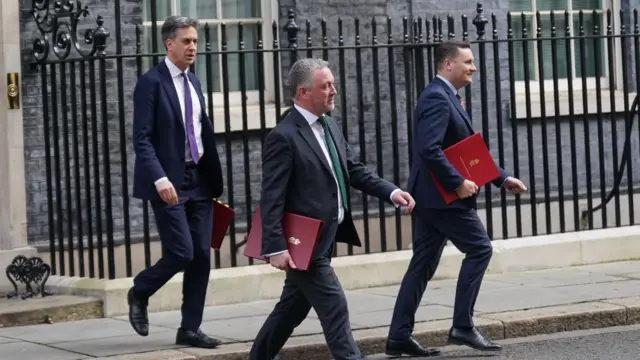 Image source, PA Media
Image source, PA Media- Image caption,
- Energy Secretary Ed Miliband, Environment Secretary Steve Reed and Health Secretary Wes Streeting leave 10 Downing Street
- A short while ago, Keir Starmer’s top team departed No 10 after what was presumably a pretty jam-packed cabinet meeting.
- We won’t get the chancellor’s traditional Red Box moment – of Budget fame – as the government insists this isn’t major economic event.
- We haven’t caught sight of Rachel Reeves yet, but we’re watching and waiting for her departure from No 11 later on.
- Our next sighting will come at midday when PMQs starts and she takes her spot on the government benches, next to the prime minister.
- Once Starmer’s done taking MPs’ questions, he’ll sit down and Reeves will replace him at the dispatch box to deliver her statement.
- It’s a busy day. Stay tuned.
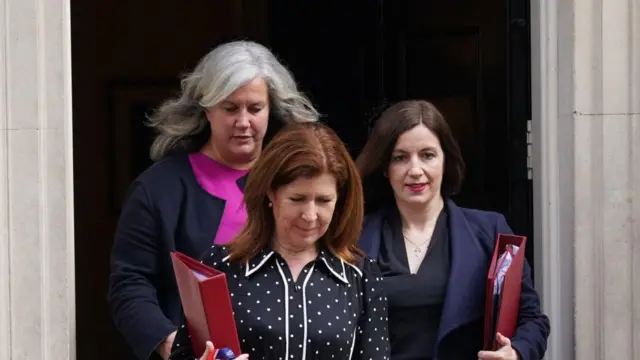 Image source, PA Media
Image source, PA Media- Image caption,
- Hot on their heels were Baroness Chapman of Darlington, Education Secretary Bridget Phillipson, and Transport Secretary Heidi Alexander
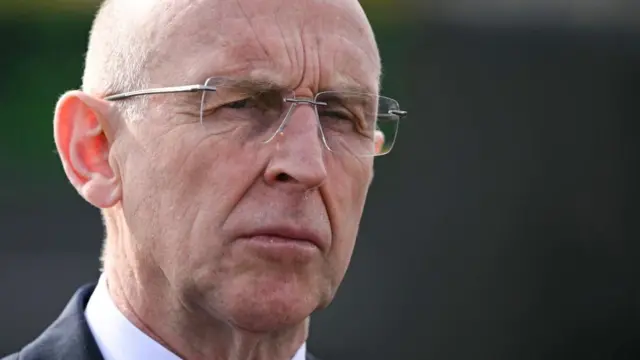 Image source, Reuters
Image source, Reuters- Defence Secretary John Healey tells BBC Radio 4’s Today programme that Reeves will provide a “tough, strong statement in tough times”, and will say the “world is changing”. The government’s task, he adds, is to “secure Britain’s future”.
- Healey is asked why the chancellor does not alter her own self-imposed rules, which limit how much she can borrow. Remember, some European nations are borrowing more in order to increase defence spending.
- “If you borrow more you have to service the cost of that borrowing, and if you borrow more, the prices go up,” he says.
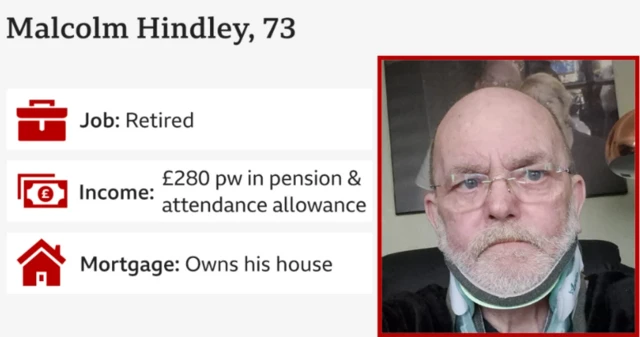
- “There doesn’t seem to be anything good on the horizon,” says Malcolm Hindley, a retired window cleaner from Liverpool.
- A widower, he lives with his daughter, who “does everything round the house” and cares for him and her disabled daughter.
- He owns his own house but finds it hard to get by on his £200-a-week state pension, plus attendance allowance of around £80 a week.
- He needs a car to get to the shops and medical appointments and has just been in a car accident that has left him with a neck brace, on top of existing mobility issues.
- He will be listening out on Wednesday for further details around cuts to benefits for the long-term sick and disabled.
- Losing the winter fuel payment was hard, he says, because he feels the cold more as he gets older. Now he is worried what else might go.
 Kevin Peachey
Kevin Peachey- Cost of living correspondent
- Among all the talk of fiscal rules and economic forecasts, there is likely to be a direct impact on your finances from the Spring Statement.
- We are not expecting any tax raising, or cutting, measures.
- But there will be more detail on the announcements about disability and incapacity benefits.
- Broader spending plans could lead to changes to local services or grants, for example.
- And watch out for the launch of consultations or longer-term plans. We will keep a keen eye out for anything that potentially changes allowances on tax-free Individual Savings Accounts (ISAs), stamp duty, or pensions in the future.
- The Spring Statement will start at about 12:30 UK time, straight after Prime Minister’s Questions. It will be broadcast live on BBC iPlayer and here on this page (just tap the watch live button above).
- We’ll bring you live updates and analysis in the lead up and throughout

 Faisal Islam
Faisal Islam- Economics editor
- UK long-term government borrowing costs continued to rise on Tuesday in a sign of the pressure Chancellor Rachel Reeves is under. New official economic forecasts will be revealed today alongside details of welfare cuts and a new squeeze on departmental spending.
- The emphatic message from No 11 is that the Spring Statement is not a Budget but is a continuation of the chancellor’s existing strategy. There will be no Red Box, no tax changes, instead only a small table of new policies, meant to correct a gap in the public finances.
- The biggest single move was already announced last week when the government outlined a £5bn cut to working-age welfare benefits. Although, since then, it looks like Reeves will have to make steeper spending cuts after being advised her reforms would not save as much as first hoped.
- The forecast from the Office of Budget Responsibility will show a weaker economy this year as well as a steep rise in interest payments on government borrowing.
- It is for this and other reasons that the chancellor will resist calls to adapt her self-imposed limits on borrowing, to account for new global realities. But she will acknowledge this “changed world”, and new details are expected on using defence spending to help boost a lacklustre economy.
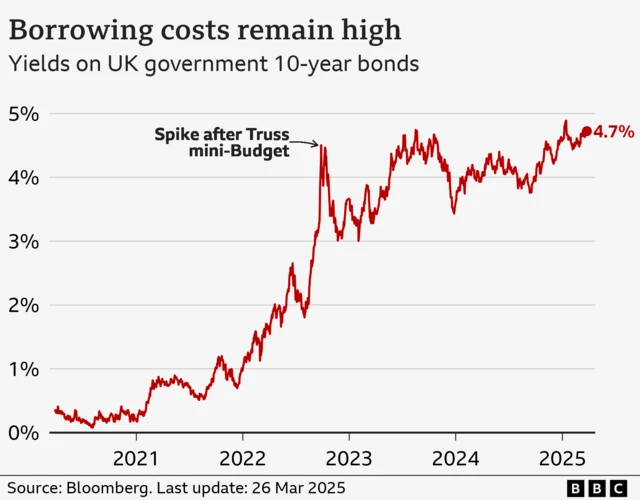
- Media caption,
- Rachel Reeves: A strong economy depends on strong defence
- There will be much talk about cuts today, but one area of government spending getting a boost is defence spending – which is heading for a £2.2bn uplift from April.
- In February, the government announced it would increase spending on defence to 2.5% of GDP by 2027, with an “ambition” to reach 3% after the next general election.
- It announced at the time it would be cutting the aid budget from 0.5% of gross national income to 0.3% in 2027 to fund the defence increase.
- In her statement to the Commons today, Reeves will say the increase in defence spending is “not just about increasing our national security but increasing our economic security, too”.
- But some economists argue the increase in defence spending will have a limited impact on economic growth.
- Some analysts have pointed out that defence spending is more capital intensive than aid spending, meaning more of it is exempted from the chancellor’s self-imposed borrowing rules.

 Dharshini David
Dharshini David- Deputy economics editor
- The chancellor has been backed into a corner by her own rules – and economic circumstances.
- Those rules, designed to maintain credibility and keep a lid on government borrowing costs – say that in five years, day to day spending (on items such as welfare and public services) has to be matched by income. In other words, taxes.
- But as she injected large amounts into public services in the October Budget, the chancellor met the rules with a slim margin to spare – £10bn, or less than 1% of government spending.
- And the economy is easily knocked off course. The growth outlook is weaker than in October, partly, some economists say, the result of the chancellor’s own tax rises. This means less money for the public purse than hoped.
- Government debt repayments are higher, largely the result of movements in global financial markets.
- So that safety margin has likely been wiped out, and to meet her “iron clad” rules, the chancellor will trim some spending plans.
- Government ministers are starting to arrive at Downing Street for a cabinet meeting, which had been pushed from Tuesday to Wednesday this week to account for the Spring Statement.
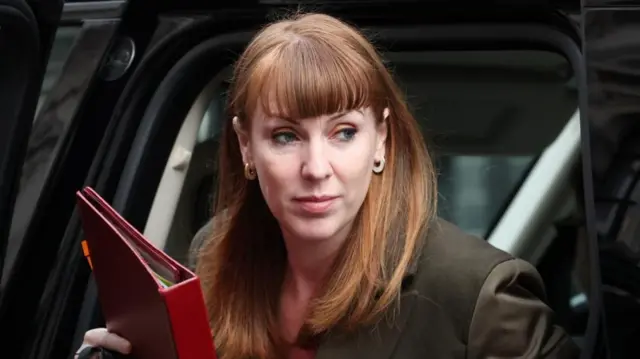 Image source, Reuters
Image source, Reuters- Image caption,
- Deputy Prime Minister Angela Rayner
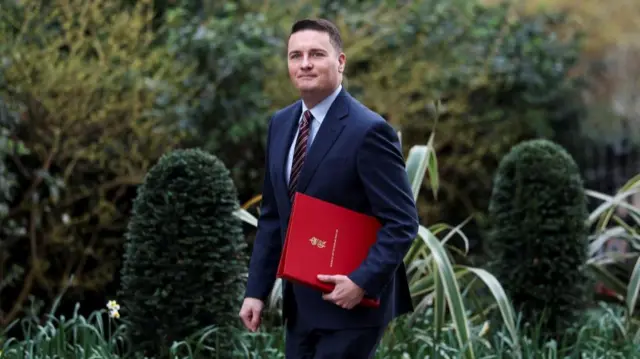 Image source, Reuters
Image source, Reuters- Image caption,
- Health Secretary Wes Streeting
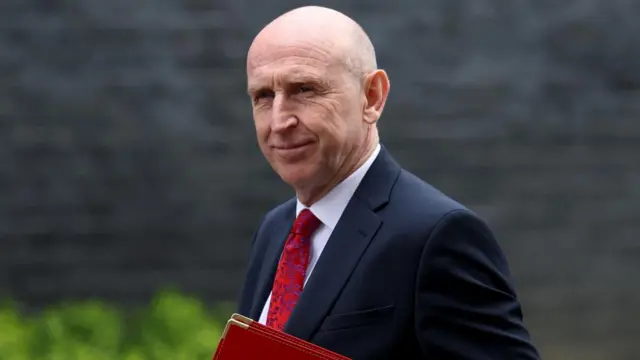 Image source, Reuters
Image source, Reuters- Image caption,
- Defence Secretary John Healey
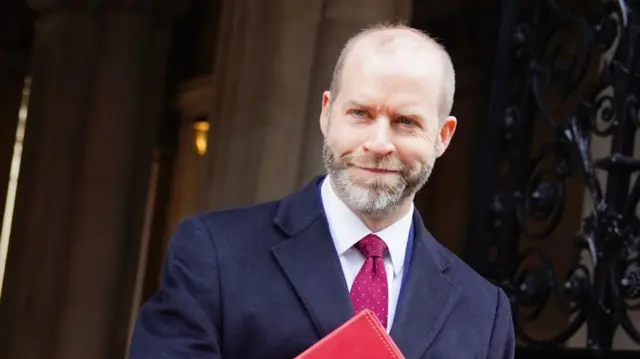 Image source, Reuters
Image source, Reuters- Image caption,
- Business and Trade Secretary Jonathan Reynolds

 Henry Zeffman
Henry Zeffman- Chief political correspondent
- Here’s one way in which the world has changed: today was not meant to be a big deal.
- As part of a commitment to give businesses and consumers the certainty of only one major fiscal event a year, the government had downgraded today to a “spring forecast”.
- The plan was that Rachel Reeves would formally note that the Office for Budget Responsibility (OBR) had produced new estimates about the state of the economy now and over the coming years, but little more than that.
- It is now much more significant: one of the big moments in the life of this government for it to demonstrate economic grip. Terminologically, it has been upgraded from a spring forecast to a Spring Statement.
- But while it has become significant it is not a Budget. We are not expecting the kinds of changes to tax policy in all walks of life that often take place in a Budget.
- And it is just one of several significant moments hurtling towards Reeves, most notably the spending review on 11 June at which she will confirm how much money each government department will have for the next three years.
- With the government under pressure over its finances, the chancellor is expected to update her growth forecast, and provide more detail on policies already announced.
- Welfare spending
- The government is looking to save £5bn a year on the welfare bill by 2030, and set out plans to that effect on 18 March. But last night it emerged Reeves is expected to widen those cuts after the Office for Budget Responsibility (OBR) estimated they would not save as much as intended.
- The watchdog’s assessment is that the changes will save £3.4bn in 2029/30 – meaning Reeves will save more than £1bn less than she thought.
- The Department for Work and Pensions (DWP) will publish details today about who will be affected.
- Civil service
- The chancellor has pledged to reduce government running costs by 15% by the end of the decade.
- About 10,000 civil service jobs are expected to go, including staff who work in HR, policy advice, communications and office management.
- Aid and defence
- The chancellor will argue the UK has to “move quickly in a changing world” and will confirm a £2.2bn increase in defence spending.
- The government announced earlier this month that it would cut the foreign aid budget to increase military spending to 2.5% of national income by 2027.
- Tom Espiner
- Business reporter
- Media caption,
- What are Rachel Reeves’s rules for the economy?
- The government has self-imposed fiscal rules, which most governments in wealthy nations have in place to try to reassure investors and maintain credibility with financial markets – essentially to keep borrowing costs down.
- Reeves’s two main rules are: not to borrow to fund day-to-day public spending; and to get debt falling as a share of the UK economic output by 2029/30.
- But some analysts have said that Reeves has “boxed herself in” by saying she will meet these fiscal targets but not raise taxes or return to austerity by making deep cuts to public services.
- But breaching fiscal rules can be costly. In September 2022 Liz Truss and Kwasi Kwarteng’s mini-Budget led to a surge in borrowing rates, which swelled mortgage rates.
- “How bad is the news?”
- That’s what Helen Miller, deputy director of the Institute of Fiscal Studies think tank, says she will be looking for when she watches the Spring Statement.
- Speaking to BBC Radio 4’s Today programme, Miller says Reeves, in her autumn Budget, set herself a “tiny margin” to operate within her fiscal rules – not to borrow to fund day-to-day public spending by 2030. We’ll bring you more details on those fiscal rules in our next post.
- Having put so much emphasis on her rules being “non negotiable”, it would be “very difficult” for Reeves to break them “at the first time of being tested”, Miller adds.
- “In some sense, again, she sort of set herself up for a problem because she made a set of promises and she can’t keep all of them,” Miller says, adding “she promised she wouldn’t change her fiscal rules, she promised no more tax rises, and she promised no more spending cuts – and she can’t deliver all of those things.”
Page 5
- Tom Espiner
- Business reporter
- The rate of UK inflation – that is, the pace of price rises – can affect your personal finances in an number of ways.
- Firstly, you’ll notice how fast bills are going up – people tend to notice food and energy prices the most.
- If prices rise faster than your wages, then you’ll have less money to spend.
- On average, though, wages have been rising faster than inflation for a couple of years.
- Secondly, the Bank of England is tasked with keeping inflation at 2%. If it is above that, the Bank may hold or raise interest rates – although it is expected that rates will go down in 2025.
- The Bank rate affects the cost of loans such as mortgages – if it goes down, mortgage rates tend to follow.
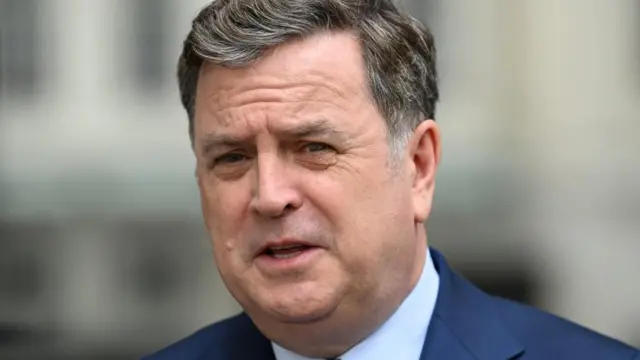 Image source, Reuters
Image source, Reuters- Although today’s figures show inflation fell in the 12 months to February, it remains above the government’s 2% target, and the Conservatives are saying government choices have “saddled the country with higher inflation for longer”.
- “We left Labour with inflation bang on target,” shadow chancellor Mel Stride says, adding unless Reeves “takes urgent action at her emergency budget today, working families will continue to pay the price”.
- Meanwhile, the Liberal Democrats say the inflation figure “will be of no comfort to the millions of families across the country who are struggling” as prices continue to rise.
- “It is time for the government to fix the mess they made in the autumn Budget and deliver a real plan for growth to finally get our economy growing,” Lib Dem Treasury spokeswoman Daisy Cooper says.

 Marc Ashdown
Marc Ashdown- Business correspondent
- An inflation reading of 0.1% below forecasts is hardly cause for celebration, but there will no doubt be sighs of relief at the Treasury this morning.
- The chancellor will be keen to set the tone for the coming year with today’s spring statement. And inflation easing off will be a help to Rachel Reeves.
- However, the pace of price rises remains well above the Bank of England’s target of 2%. And analysts warn that this dip could be the “calm before the storm”.
- Next month prices for the new tax year will come into effect, with bills for energy, water and council tax all set to rise.
- With measures from October’s Budget also expected to push costs up for many businesses, the rate of inflation is expected to now increase again for most of the year.
- Economists expect it to peak at around 4% in September but ease back to around 2% by this time next year.
- The pressure on costs for the government, business, and hard pushed households shows no sign of letting up just yet.

 Dharshini David
Dharshini David- Deputy economics editor
- Chancellor Rachel Reeves is expected to reveal later that her independent forecasters have downgraded their growth expectations for this year from 2% to maybe 1% as other economists have done.
- The chancellor will say the world has changed, amid geopolitical uncertainty.
- But the Conservatives have labelled her a “growth killer”, as surveys suggest many businesses are looking to reduce headcount and/or raise prices on the back of policies such as the rise in National Insurance contributions.
- Reeves may point to the measures such as housebuilding, designed to boost growth. But these take years to deliver.
- In the meantime, households could be short-changed. The October Budget forecast suggested that on average we’d each be £500 better off after inflation by 2030, making it the second worst Parliament on record for living standards.
- Now, the predicted gains could be smaller. Growth really is far more than just a line on the chart.
- Let’s pause for a moment to look at what is meant by economic growth, which will be a focal point of today’s updates on the economy.
- It normally refers to how much the production of goods or services has increased over a given period of time.
- One way to measure growth is Gross Domestic Product (GDP), which is the value of those goods and services.
- If GDP is steadily rising, people pay more in tax because they’re earning and spending more.
- The government can then choose to spend that money on public services, such as schools, the police, and hospitals.
- But when the economy stagnates, or shrinks, the government can choose to rein in spending.
 Image source, Reuters
Image source, Reuters- We’ve just had the government’s response to the inflation rate falling to 2.8% – saying it is focused on delivering economic growth and stability.
- In a statement, Treasury minister Darren Jones says: “Our number one mission is kickstarting growth to raise living standards for working people, that is why we are protecting working people’s payslips from higher taxes.
- “In a changing world, we’re focused on delivering economic stability to secure people’s finances – freezing fuel duty, protecting the triple lock and increasing the national living wage by £1,400 a year for full-time workers, while going further and faster to drive growth through our plan for change.”

 Dharshini David
Dharshini David- Deputy economics editor
- Growth is not only the government’s number one mission but may be one of its biggest headaches.
- But the chancellor got a little relief from the latest inflation figures which showed a slowdown in price rises in February. But that might be short-lived.
- First, as the dip in inflation was caused by discounting of items like clothing – a volatile component.
- And second as a recent survey, also from the ONS, revealed, almost a half of businesses are considering price rises as they brace for next month’s tax rises and increase in National Living Wage.
- Today’s OBR forecasts are expected to point to a further increase in inflation – but only a slight and short-lived one.
- Tom Espiner
- Business reporter
- Inflation was lower in February, mainly due to a fall in the price of women’s clothes, says ONS chief economist Grant Fitzner.
- This was only partially offset by small increases in alcoholic drinks, for example, he said.
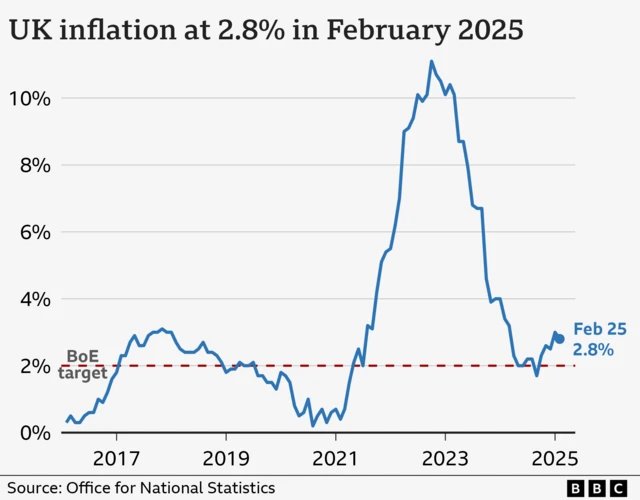
- Tom Espiner
- Business reporter
- The inflation rate has come in lower than expected at 2.8% for February, down from the 3% recorded for January.
- Analysts had expected that figure to be 2.9%.
- It remains above the Bank of England’s target of 2%.
- The Bank expects inflation to temporarily rise to 3.7% this year, mainly due to higher energy prices.
- The UK inflation rate falls to 2.8% in the year to February, the latest figures from the Office for National Statistics show.
- Tom Espiner
- Business reporter
- We’ll shortly get the latest inflation figures for February, but what does that actually mean?
- Inflation is the pace of price rises over a certain time period, given as a percentage.
- So if annual inflation on a bottle of milk is running at 5%, then milk that cost £1 a year ago will now cost £1.05.
- People tend to notice inflation in food and energy prices the most.
- In the year to January, food price inflation was 3.3% – and that is after a big spike that started at the end of 2021 and peaked at more than 19% in March and April 2023 before coming back down.
- You may have noticed that going to the supermarket is still a bit of a shock. Although inflation comes down, prices themselves tend not to fall, at least not significantly.
- Quite aside from that, the Bank of England has a 2% target for inflation, and uses interest rates to try to control it.
- People tend to notice the effects of this on the cost of loans such as mortgages.
- The UK’s economic performance has been pretty lacklustre for the past few years, with low growth and rising prices.
- Last month, the Bank of England halved its growth forecast, and the government’s independent forecaster the Office for Budget Responsibility is also likely to downgrade its growth prediction today.
- Some economists expect that there will be cuts to government spending so Rachel Reeves can meet self-imposed tax and spending rules – more on that shortly.
- The predictions for this year are quite gloomy too. With the Bank expecting inflation to rise to 3.7% between July and September 2025 due to higher energy prices, water bills and bus fares, and sluggish growth, it sets the scene for “stagflation” – rising prices and low growth eating into living standards.
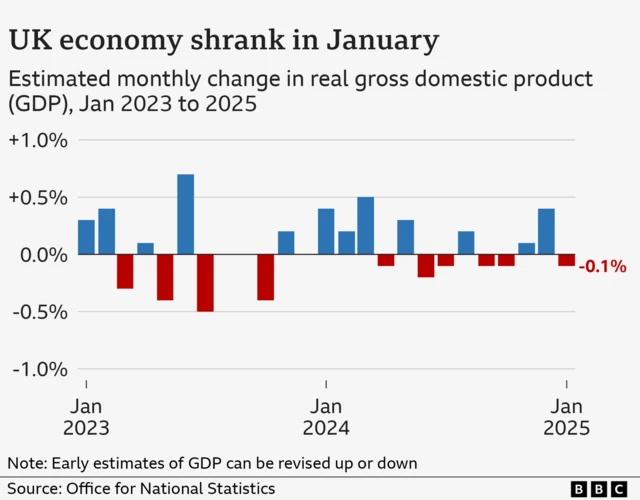
- What does today mean for me? What is the chancellor announcing? What is a Spring statement exactly?
- As part of Your Voice, Your BBC News, our business and politics teams are on hand to answer your questions today. To get in touch:


 Henry Zeffman
Henry Zeffman- Chief political correspondent
- It was already a curious element to today that we knew the shape of the chancellor’s biggest announcement, namely the benefit cuts (also known as welfare reform, usually depending on which side of the argument a given politician is coming from).
- Not so fast. The fact that Rachel Reeves will have to announce further cuts today because of the mismatch between the government and the Office for Budget Responsibility (OBR) about how much her policies will save risks inflaming the row within the Labour Party about her approach.
- Today we will also get crucial new information in the form of the government’s own impact assessment. This will set out in much more detail what kind of claimants will be affected by the reforms.
- One question running through Labour’s debate on this has been whether the government is doing this because it wants to – a moral mission to get people back into work – or because it has to – an accounting ploy to make the numbers add up.
- As ever, the answer is probably somewhere between the two, but the latest negotiations between the government and the OBR will strengthen the claims of those in Labour who argue the latter.
- Michael Race, Faisal Islam & Joshua Nevett
- Business reporter, Economics editor & Political reporter
- Chancellor Rachel Reeves is set to make further cuts to welfare benefits and government departments in her Spring Statement today.
- The government announced big welfare spending reductions last week but the chancellor is set to expand the cuts after being told reforms to the system would save less than planned.
- It emerged last night that Reeves would widen her cuts to welfare after the Office for Budget Responsibility (OBR), which monitors the government’s spending plans, estimated the welfare system reforms would not save the £5bn as planned.
- The reforms include stricter tests for personal independence (Pip) payments, affecting hundreds of thousands of claimants.
- But it is understood the OBR assessed that many claimants facing losing health-related benefit payments would instead claim for more severe conditions.
- The government did not deny reports, first carried by The Times, external that the chancellor would make further cuts to try to make up some of the shortfall.
 Emily Atkinson
Emily Atkinson- Live page editor
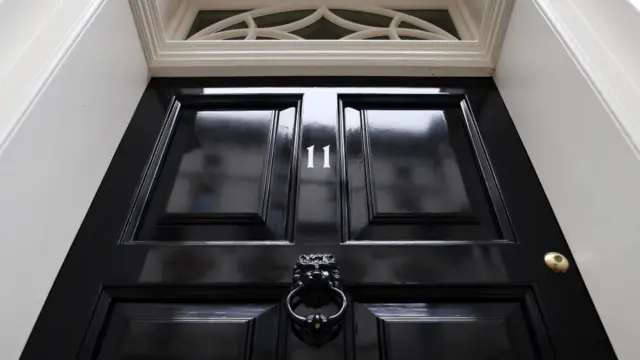 Image source, EPA-EFE/REX/Shutterstock
Image source, EPA-EFE/REX/Shutterstock- Here’s a look at what’s to come (all timings below are in GMT):
- Early doors – at 07:00 – the Office for National Statistics (ONS) will publish the latest inflation figures, which will tell us how prices are rising across the UK.
- Come 08:30, the prime minister will hold his weekly cabinet meeting, moved this week from Tuesday to Wednesday to account for the Spring Statement.
- At around 11:20, Rachel Reeves, the chancellor, will depart No 11 Downing Street and head for the House of Commons.
- She’ll take her place on the government benches at 12:00, at which point Prime Minister’s Questions gets going.
- After that finishes – at approximately 12:30 – Reeves will deliver her Spring Statement.
- The OBR will also publish its latest economic and fiscal outlook. Its chair, Richard Hughes, will follow this up with a news conference at 14:30. And at some point today – timing TBC – the Department for Work and Pensions (DWP) will publish an impact assessment into the government’s welfare reforms.
- We’ve got a packed day ahead of us. Settle in.
 Emily Atkinson
Emily Atkinson- Live page editor
- At 12:30 GMT, Chancellor Rachel Reeves delivers her Spring Statement on the state of the UK economy – and the government’s spending plans.
- It’s not a Budget, so don’t expect major tax rises or cuts.
- But we will get an idea of how much government has to spend, including what Reeves calls “tactical cuts to public spending” to shore up the UK finances in “unprecedented times”.
- We’re also expecting to hear the Office for Budget Responsibility cut its forecasts for UK growth – further restricting the choices of a chancellor who says growth is her “number one mission”.
- On top of that, we have Prime Minister’s Questions at 12:00 – Keir Starmer versus Kemi Badenoch – and the latest UK inflation figures at 07:00.
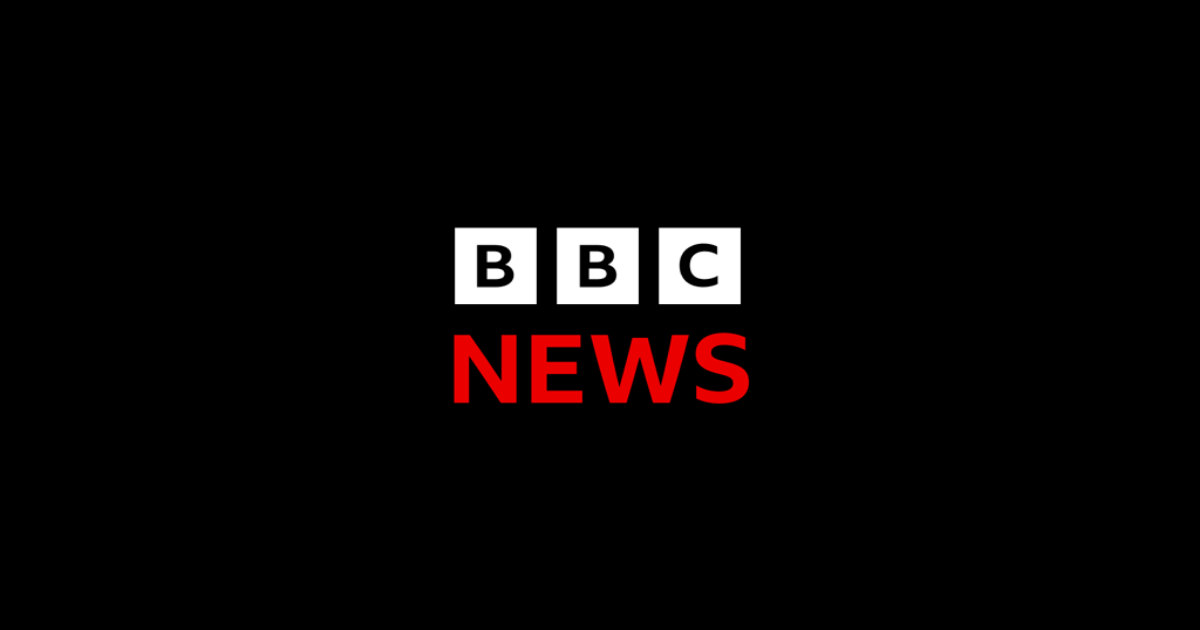


 Kevin Peachey
Kevin Peachey Dharshini David
Dharshini David Image source, Getty Images
Image source, Getty Images Image source, UK Parliament
Image source, UK Parliament Image source, UK Parliament
Image source, UK Parliament
 Image source, UK Parliament
Image source, UK Parliament Image source, UK Parliament
Image source, UK Parliament Image source, UK Parliament
Image source, UK Parliament Simon Jack
Simon Jack Image source, UK Parliament
Image source, UK Parliament Image source, UK Parliament
Image source, UK Parliament Faisal Islam
Faisal Islam Image source, UK Parliament
Image source, UK Parliament Damian Grammaticas
Damian Grammaticas Image source, UK Parliament
Image source, UK Parliament Emily Atkinson
Emily Atkinson Image source, PA Media
Image source, PA Media Image source, UK Parliament
Image source, UK Parliament Damian Grammaticas
Damian Grammaticas Image source, UK Parliament
Image source, UK Parliament Image source, UK Parliament
Image source, UK Parliament Henry Zeffman
Henry Zeffman Image source, UK Parliament
Image source, UK Parliament Image source, UK Parliament
Image source, UK Parliament Image source, UK Parliament
Image source, UK Parliament Image source, UK Parliament
Image source, UK Parliament Emily Atkinson
Emily Atkinson Dharshini David
Dharshini David Image source, EPA
Image source, EPA Henry Zeffman
Henry Zeffman Image source, Reuters
Image source, Reuters Kevin Peachey
Kevin Peachey Emily Atkinson
Emily Atkinson Image source, Supplied
Image source, Supplied
 Faisal Islam
Faisal Islam Glenn Campbell
Glenn Campbell Gareth Lewis
Gareth Lewis Henry Zeffman
Henry Zeffman Image source, PA Media
Image source, PA Media Image source, PA Media
Image source, PA Media Image source, Reuters
Image source, Reuters
 Kevin Peachey
Kevin Peachey Faisal Islam
Faisal Islam
 Dharshini David
Dharshini David Image source, Reuters
Image source, Reuters Image source, Reuters
Image source, Reuters Image source, Reuters
Image source, Reuters Image source, Reuters
Image source, Reuters Henry Zeffman
Henry Zeffman Image source, Reuters
Image source, Reuters Marc Ashdown
Marc Ashdown Dharshini David
Dharshini David Image source, Reuters
Image source, Reuters Dharshini David
Dharshini David


 Henry Zeffman
Henry Zeffman Emily Atkinson
Emily Atkinson Image source, EPA-EFE/REX/Shutterstock
Image source, EPA-EFE/REX/Shutterstock Emily Atkinson
Emily Atkinson
